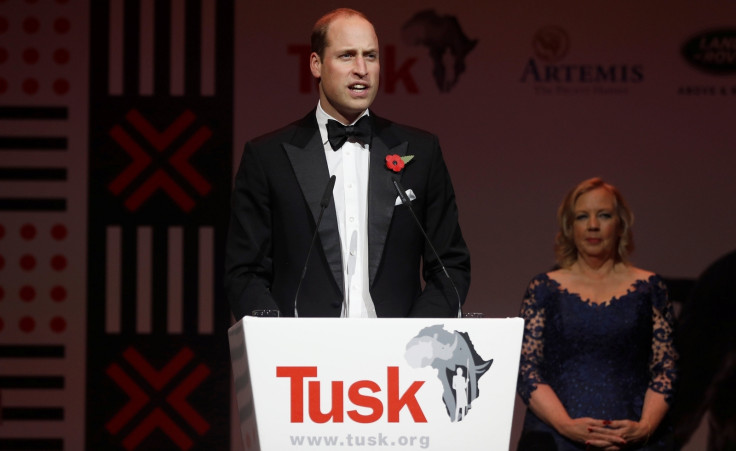Prince William speaks out against illegal wildlife trade: 'It's barbaric and it supports organised crime'
The royal patron of the Tusk Trust urged stronger measures to protect and preserve global wildlife populations.

Prince William has spoken time and again against illegal wildlife and poaching and on 2 November used his voice once again to encourage countries to work towards protecting animals from the "barbaric" practice.
The Duke of Cambridge made the plea during the gala dinner hosted by the Tusk Trust, for which he is a royal patron.
"In my lifetime, we have seen global wildlife populations decline by over half," he said, pointing out that rapid rise in human population was specifically to blame for the problem.
"Africa's rapidly growing human population is predicted to more than double by 2050 — a staggering increase of three and a half million people per month. There is no question that this increase puts wildlife and habitat under enormous pressure," the 35-year-old continued, explaining that while urbanisation, infrastructure development, cultivation were positive in themselves, they were also having a "terrible impact".
William went on to urge those in attendance at the black-tie event at the Roundhouse in London, to participate in finding solutions to "ensure that human beings and the other species of animal with which we share this planet can continue to co-exist".
He also touched on the importance of curbing illegal wildlife trade and poaching. "It is barbaric, it destroys livelihoods and communities, and it supports organised crime," he said (via The Telegraph). "The world is a worse place for it, and we must stamp it out."
Founded in 1990, Tusk Trust has been working towards conservation of Africa's natural heritage through community development and environmental education. Along with Prince William, its patrons include TV personalities Zoe Ball and Bear Grylls along with music legends Mark Knopfler and Ronnie Wood.
Last month, the trust celebrated the UK government's plan to put an end to ivory trade of all ages. Earlier, ivory produced before 1947 was exempt from the ban. Despite the restrictions, the country is one of the highest exporters of legal ivory carvings and antiques
William himself had previously urged the government to impose a blanket ban on all ivory trade within the country. "We know now what previous generations did not — ivory treated as a commodity is the fuel of extinction," he said at an international conference in Vietnam in 2016. "Ivory is not something to be desired and when removed from an elephant it is not beautiful.
"We need governments to send a clear signal that trading in ivory is abhorrent."






















